Tapas: Five Options that You Can Enjoy on a Diet
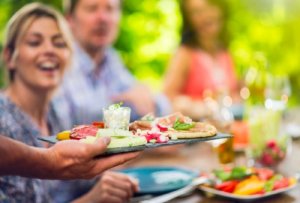
Going out for tapas is a staple of Spanish culture that is enjoyed around the world. When people begin a diet, they often give up these delicacies. In this article, we will show you which tapas will not derail your diet.
All the options featured in this article are diet-friendly. They are also traditional tapas dishes that you can find in any bar. If you would rather enjoy a casual dinner at home, you can also make these dishes yourself. Treat your guests to a healthy and delicious meal.
Tapas options: banderillas
Banderillas are one of the least calorie-heavy options you can find at a tapas bar. They usually combine olives, peppers, chives, pickles, and chillies. All of these ingredients are low in calories.
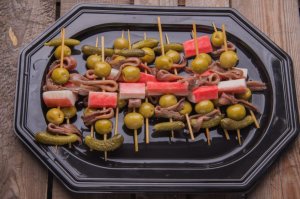
The only thing you need to watch is the amount of oil. Occasionally, an excess of oil can make this healthy option unhealthy.
Pickles are an important part of any diet. Besides adding very few calories, they offer many beneficial properties. These include:
- Improving bowel transit.
- Facilitating digestion.
- Providing vitamin C.
In addition, you can buy pickles already made, or make them yourself to suit your taste. As you can see, there are plenty of reasons to enjoy this healthy tapas dish.
Mussels
Mussels are another great tapas dish. You can prepare them in a variety of ways, and they are very simple and easy to make. The most popular dish involves adding diced onions and peppers (as pictured below). Another option is to add a tablespoon of homemade tomato sauce.
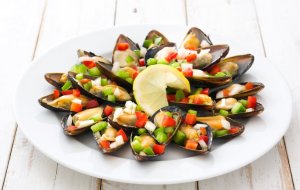
Mussels are also rich in protein and low in fat, making them perfect for dieters and athletes alike. They also offer vitamin B12 and vitamin A, and serve as a potent antioxidant to rejuvenate the skin.
Many bars also serve “tiger mussels.” This version is not as healthy as the ones already mentioned, because the preparation involves stuffing the mussels and frying them in batter. If you are on a diet, avoid this option in favor of healthier variations.
Garlic prawns
Our third option is also healthy, low in calories, and easy to make. Universally popular, it will be a big hit amongst your guests. The recipe involves just five ingredients: prawns, garlic, oil. salt, and chopped parsley. It is usually served in a clay dish or on skewers.
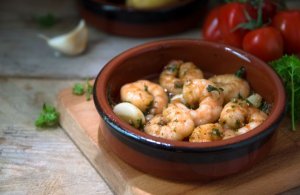
Prawns are one of the world’s most popular seafood products. Their benefits include:
- Low calorie content.
- Vitamin B.
- Rich in minerals.
- High protein content.
As you can see, prawns are much more than just a low-calorie food. Be good to your body while enjoying some delicious garlic prawn brochettes.
Pulpo a la Gallega (Galician-style octopus)
Galician-style octopus is a dish native to the Autonomous Community of Galicia. Passed down from generation to generation, this dish is a true tradition. It is important to prepare it correctly so that the octopus is not too tough. If you visit Galicia, do not miss out on this delicious tapas dish, whether you are on a diet or not.
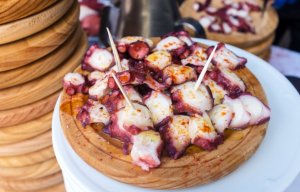
Octopus is low in fat and low in cholesterol. It also contains many minerals and vitamins. As such, it is a healthy addition to all kinds of diets.
Traditionally, Galician-style octopus is served with the slices of octopus and a dash of paprika, on top of a bed of mashed potatoes. If you are suffering from digestive problems, paprika will help your situation.
Pimientos de Padrón (Padrón-style peppers)
To complete this list of diet-friendly tapas dishes, we have selected Padrón-style peppers. Like Galician-style octopus, it is a culinary tradition of Galicia. Beyond its origin, it is also popular throughout Spain, and can be found virtually anywhere in the country.
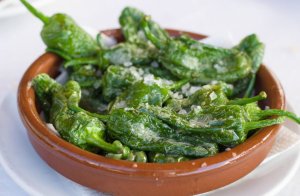
Padrón-style peppers are under five centimeters in length, and they are green in color. They are cooked in olive oil and salt and they make a great accompaniment to other tapas or pinchos.
The beneficial properties of this dish include fiber and vitamins C and E. If you fry them, the caloric content increases significantly, so make sure you pay attention to their preparation.
Going out for tapas is a staple of Spanish culture that is enjoyed around the world. When people begin a diet, they often give up these delicacies. In this article, we will show you which tapas will not derail your diet.
All the options featured in this article are diet-friendly. They are also traditional tapas dishes that you can find in any bar. If you would rather enjoy a casual dinner at home, you can also make these dishes yourself. Treat your guests to a healthy and delicious meal.
Tapas options: banderillas
Banderillas are one of the least calorie-heavy options you can find at a tapas bar. They usually combine olives, peppers, chives, pickles, and chillies. All of these ingredients are low in calories.

The only thing you need to watch is the amount of oil. Occasionally, an excess of oil can make this healthy option unhealthy.
Pickles are an important part of any diet. Besides adding very few calories, they offer many beneficial properties. These include:
- Improving bowel transit.
- Facilitating digestion.
- Providing vitamin C.
In addition, you can buy pickles already made, or make them yourself to suit your taste. As you can see, there are plenty of reasons to enjoy this healthy tapas dish.
Mussels
Mussels are another great tapas dish. You can prepare them in a variety of ways, and they are very simple and easy to make. The most popular dish involves adding diced onions and peppers (as pictured below). Another option is to add a tablespoon of homemade tomato sauce.

Mussels are also rich in protein and low in fat, making them perfect for dieters and athletes alike. They also offer vitamin B12 and vitamin A, and serve as a potent antioxidant to rejuvenate the skin.
Many bars also serve “tiger mussels.” This version is not as healthy as the ones already mentioned, because the preparation involves stuffing the mussels and frying them in batter. If you are on a diet, avoid this option in favor of healthier variations.
Garlic prawns
Our third option is also healthy, low in calories, and easy to make. Universally popular, it will be a big hit amongst your guests. The recipe involves just five ingredients: prawns, garlic, oil. salt, and chopped parsley. It is usually served in a clay dish or on skewers.

Prawns are one of the world’s most popular seafood products. Their benefits include:
- Low calorie content.
- Vitamin B.
- Rich in minerals.
- High protein content.
As you can see, prawns are much more than just a low-calorie food. Be good to your body while enjoying some delicious garlic prawn brochettes.
Pulpo a la Gallega (Galician-style octopus)
Galician-style octopus is a dish native to the Autonomous Community of Galicia. Passed down from generation to generation, this dish is a true tradition. It is important to prepare it correctly so that the octopus is not too tough. If you visit Galicia, do not miss out on this delicious tapas dish, whether you are on a diet or not.

Octopus is low in fat and low in cholesterol. It also contains many minerals and vitamins. As such, it is a healthy addition to all kinds of diets.
Traditionally, Galician-style octopus is served with the slices of octopus and a dash of paprika, on top of a bed of mashed potatoes. If you are suffering from digestive problems, paprika will help your situation.
Pimientos de Padrón (Padrón-style peppers)
To complete this list of diet-friendly tapas dishes, we have selected Padrón-style peppers. Like Galician-style octopus, it is a culinary tradition of Galicia. Beyond its origin, it is also popular throughout Spain, and can be found virtually anywhere in the country.

Padrón-style peppers are under five centimeters in length, and they are green in color. They are cooked in olive oil and salt and they make a great accompaniment to other tapas or pinchos.
The beneficial properties of this dish include fiber and vitamins C and E. If you fry them, the caloric content increases significantly, so make sure you pay attention to their preparation.
All cited sources were thoroughly reviewed by our team to ensure their quality, reliability, currency, and validity. The bibliography of this article was considered reliable and of academic or scientific accuracy.
- Domene, Miguel Ángel; Juan Carlos Gázquez y David E. Meca. (2014). Evaluación de la calidad interna en especialidades de pimientos: sustancias nutritivas y bioactivas. Cajamar. https://www.publicacionescajamar.es/publicacionescajamar/public/pdf/series-tematicas/centros-experimentales-las-palmerillas/evaluacion-de-la-calidad-interna.pdf
- Fundación Española de Nutrición (FEN). Crustáceos y Moluscos. https://www.fen.org.es/storage/app/media/flipbook/mercado-alimentos-fen/012-Crustaceos.pdf
- García-Zapata, L. (2016). Producción de bacteriocinas de bacterias lácticas aisladas de encurtidos. Jaén: Universidad de Jaén.
- Mercado-Mercado, Gilberto, Rosa Carrillo, Laura de la, Wall-Medrano, Abraham, López Díaz, José Alberto, & Álvarez-Parrilla, Emilio. (2013). Compuestos polifenólicos y capacidad antioxidante de especias típicas consumidas en México. Nutrición Hospitalaria, 28(1), 36-46. https://dx.doi.org/10.3305/nh.2013.28.1.6298
This text is provided for informational purposes only and does not replace consultation with a professional. If in doubt, consult your specialist.








